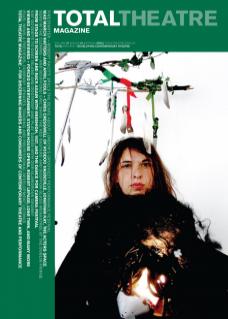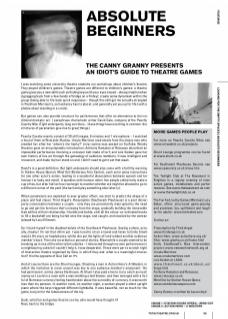I was watching some university theatre students run workshops about children’s theatre. They played children’s games. Theatre games are different to children’s games: a theatre game gives you a new skill (such as finding keys with your eyes closed – always helpful when zigzagging back from a few hands of bridge on a Friday); create some dynamism within the group (being able to fire back quick responses – though this skill got me actually strangled in Peckham Morrison’s, so hesitancy has its place); and generally set you up for life (with a phobia about standing in a circle).
But games can also provide structure for performance that offer an alternative to the traditional dramatic arc. I paraphrase charismatic writer David Gale, compere of the Peachy Coochy Nite. (Tight underpants, long corridors... these things have one thing in common: the strictures of parameters give rise to great things.)
Peachy Coochy events consist of 20 still images, 6 minutes and 1 microphone – I watched a host of them at Riverside Studios. Ursula Martinez read emails from the sleazy men who emailed her after her ‘where’s the hanky?’ strip routine was posted on YouTube; Wendy Houston gave an encyclopaedic introduction; Anthony Hampton of Rotozaza described an impossible performance involving a conveyor belt made of turf; and Lois Keidan gave her own history of live art through the genealogy of audience members. It was intelligent and irreverent, and made my hair stand on end. I didn’t need to get it set that week.
David’s is a good definition. But tight underpants should also come with a fertility warning. In Station House Opera’s Mind Out (Battersea Arts Centre), each actor gives instructions for one other actor’s action, leading to a wonderful dissociation between speech and behaviour (or body and mind). It sparkles with humour when five people collectively make a cup of tea, but after half an hour we begin to wonder whether we might be allowed to go to a different corner of the yard (the bar) and play something else (sherry).
When parameters are exploited to ever-greater effect, we start to predict the shape of a piece and feel clever. Third Angel’s Presumption (Southwark Playhouse) is a post dinnerparty conversation between a couple – only they are persistently interrupted by the need to go and get the furniture that’s missing from the stage, gradually building the immovable Ikea edifice of their relationship. It builds and builds, until all the colour-co-ordinated books to fill a bookshelf are being hurled onto the stage, and caught, and stacked by the woman (played by Lucy Ellinson).
So I found myself in the disabled toilets of the Southwark Playhouse. Seeing a show, actually, cheeky! I’m not that infirm yet. I was lured to sit on a towel and listen to Emily Smallwood’s life story on headphones, whilst she put the lights off and rubbed another audience member’s back. Then she recorded our personal stories. Meanwhile a couple seemed to be breaking up in one of the other toilet cubicles – I interacted through my own performance in a neighbouring cubicle (I couldn’t help it, I was desperate). These were part a scratch night of interactive theatre organised by Glue, in which they ask: what is a meaningful interaction? It is the opposite of Quiz Call on ITV.
And of course there are the Shunt lounges. Shooting a man in Action Hero’s A Western, in which the invitation to move around was key to one audience-member’s enjoyment: ‘He had permission’, writes James Stenhouse. At Shunt I also paid a fee to try to catch as much money as I could in a room with a man wielding a leaf blower; and then emerged with a fistful of Burmese currency feeling heartbroken about the surreality of currency. It was worth less than my pension. In another room, on another night, a woman played a silent upright piano where the keys triggered different lightbulbs. It was beautiful, not so much for the game, but just for the fabulousness of the toy.
Gosh, what fun and games theatre can be, who would have thought it? Now, back to the bridge.
More games people play
For more on Peachy Coochy Nites see www.artsadmin.co.uk/projects
Shunt Lounge programme can be found at www.shunt.co.uk
For Southwark Playhouse Secrets see www.spsecrets.co.uk/clues.htm
The Twilight Club at The Basement in Brighton is a regular evening of interactive games, installations and performances. See www.thebasement.uk.com or www.thetwilightclub.co.uk
The Fun Fed, led by Games Mistress Lucy Baker, offers structured game-playing and promises ‘joy, upliftment and laughter for adults’. www.thefunfed.com
Further on:
Presumption by Third Angel: www.thirdangel.co.uk
Action Hero: www.actionhero.org.uk/
Glue: www.gluehq.co.uk/home.html
Emily Smallwood’s Blue Intervention project: www.newworknetwork.org.uk
Ursula Martinez: www.ursulamartinez.com
Lois Keidan at LADA: www.thisisliveart.co.uk /about_us/biogs.html
Anthony Hampton and Rotozaza: www.rotozaza.co.uk
Mind Out by Station House Opera: www.stationhouseopera.com
Canny Granny is written by Laura Lloyd

